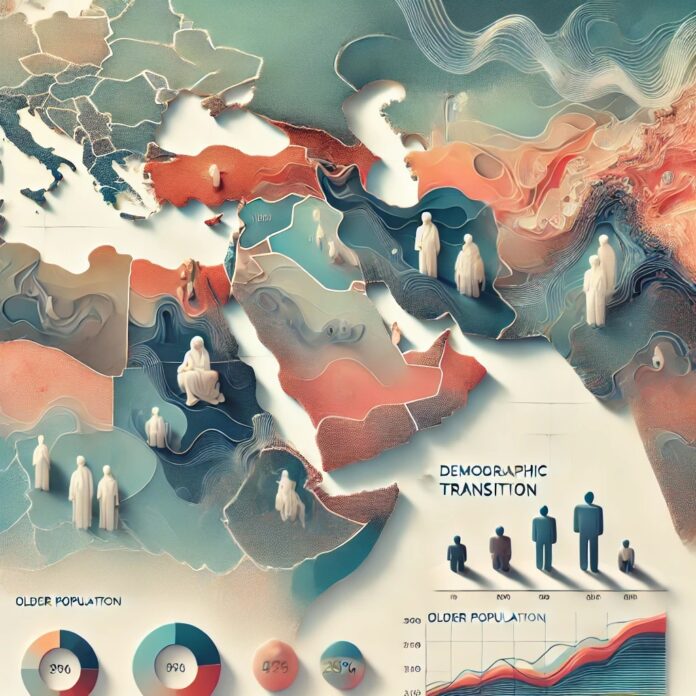At the 7th International Long-Term Care Policy Network (ILPN) Conference, Bilbao, Spain, September 2024. Professor Shereen Hussein was interviewed and talked to us about ageing and long-term care in the Middle East and how the MENARAH Network collaborates with colleagues across the region to improve policy and practice through a newly established network. Below, we reflect on the conversation and draw out the key messages.
Demographic Transitions: Fast-Forwarding Through Change
The Arab region is undergoing some of the fastest demographic transitions in the world. While European countries have had centuries to adapt to ageing populations, parts of the Middle East—particularly in the Gulf—are experiencing this transition in just 10 to 12 years. This rapid change necessitates quick policy adaptations to design systems that can effectively support ageing populations.
Despite these pressing needs, ageing populations still represent a relatively small portion of the region’s population. Policymakers often prioritize the immediate needs of youth, such as education, housing, and employment. However, balancing these priorities while preparing for an ageing society is essential.
The MENARAH Network: A Platform for Change
To address these challenges, the MENARAH Network aims to facilitate collaboration between policymakers, researchers, and organizations to tackle ageing and long-term care issues in the Middle East. By working with international organisations such as the World Health Organization (WHO), the United Nations, and the World Bank, the MENARAH Network is creating space for innovative policy development and practical interventions. The network advocates for cost-effective and impactful approaches to improve the quality of life for older adults and those living with disabilities across the region.
The Absence of Systems: A Blank Canvas for Innovation
The lack of formalised systems is a significant barrier to advancing long-term care (LTC) in the Arab region. While this presents challenges, it also offers an opportunity to design innovative frameworks tailored to local needs rather than retrofitting systems from other contexts.
Grassroots and community-based support have historically filled gaps in care. In conflict zones like Syria and The Occupied Territory of Palestine, peer support networks have emerged as lifelines for older adults. These efforts, while informal, underscore the potential for bottom-up solutions to complement formalized systems. Policymakers can leverage these grassroots initiatives to build equitable and sustainable LTC frameworks.
Building Long-Term Care Systems: A Win-Win Opportunity
Developing LTC systems is not just about addressing the needs of older adults—it’s also an opportunity to stimulate economic growth and job creation. The LTC sector can generate employment for both men and women, offering diverse roles ranging from caregivers and care coordinators to IT specialists and managers. This is particularly valuable in countries with high youth unemployment.
Moreover, regulated and well-structured LTC systems can ensure access to quality care, reduce inequalities, and generate economic returns through taxation and workforce formalization. However, unregulated private markets, already present in some countries, risk perpetuating disparities and delivering substandard care.
The Road Ahead: Prioritizing Aging in Policy Agendas
For governments in the Arab region, recognising the interconnectedness of ageing and other policy areas is crucial. Today’s youth will become tomorrow’s older adults, and investing in health, education, and employment today will shape the future of ageing societies. Supporting informal caregivers—many of whom are young—can also alleviate the burden of care while fostering intergenerational solidarity.
Advocacy efforts by networks like MENARAH aim to elevate ageing and LTC as priorities within national development agendas. Collaboration with reputable organizations such as WHO, the UN, and the World Bank helps bring credibility and weight to these discussions, encouraging governments to take action.
Conclusion
The Arab region stands at a pivotal moment. Rapid demographic shifts demand urgent action but offer an unprecedented opportunity to innovate. By investing in long-term care systems, policymakers can address the needs of ageing populations while driving economic growth, reducing inequalities, and building resilient communities.
The MENARAH Network remains committed to fostering dialogue, generating evidence, and supporting policy solutions that reflect the region’s unique needs. Together, we can ensure that ageing populations across the Arab world enjoy the dignity, support, and quality of life they deserve.
Watch the full interview:
For more information about ILPN, visit www.ilpnetwork.org. To connect with a global community of long-term care experts, consider joining the Global Observatory of Long-Term Care (GOLTC): https://goltc.org/add-new-expert/.
Blog image generated by AI.





